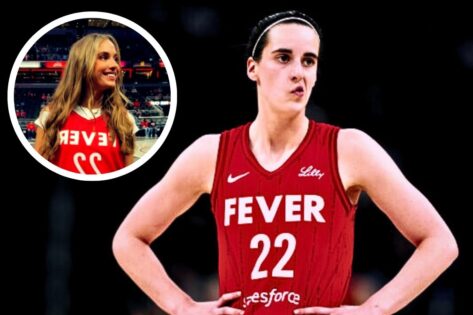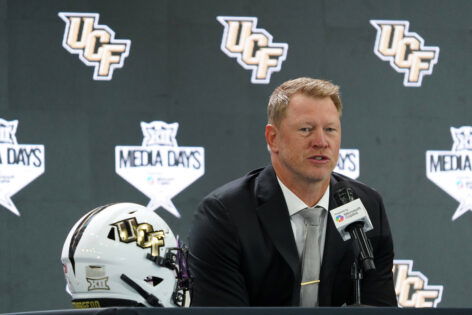Rachel DeMita learned the hardest lesson of her blooming Big3 career under the dim glow of a courtside LED screen. One moment, she was pumped, soaking in the buzz of Ice Cube’s three‑on‑three league, clutching her mic and doing her best as a courtside host. Next, she sat alone in an empty studio, her phone buzzing with an 11 PM email that cut her loose. No phone call. No meeting. Just a curt note accusing her of a “severe lapse in judgment” for sharing a Caitlin Clark highlight amid a live Big3 broadcast. In an instant, the dream role created just for her evaporated—and with it, the illusion of safety in sports media’s gig economy. But DeMita’s story isn’t just about a single tweet or a league’s brand bubble. It’s about the precarious precipice every freelancer walks, where one misstep can send you plummeting into the abyss.
DeMita didn’t sugarcoat it on The Courtside Club:
“And I don’t want to make this any more dramatic than it needs to be. So with all of that being said, the rumors are true. I was fired from the Big3 and my team received an email at 11 PM on Tuesday with a letter that essentially said that I had been terminated.”
Imagine pouring your energy into a role announced June 10, 2024—only to discover, a year and a half later, that the moment you dared celebrate one league’s star, you were instantly persona non grata. That Caitlin Clark clip—an 11‑point barrage that had made even rival fans gasp—wasn’t just poorly timed. In Big3’s brand‑control vacuum, it was a betrayal. Management’s email thundered:
“The league is extremely dismayed and disappointed by Ms. DeMita’s severe lapse in judgment while performing services for the league… Management was completely taken aback to learn that she was posting about another league’s games.”
DeMita’s mistake? She’d tweeted, “for those who question the hype,” alongside a video of Clark’s dagger three—an act of fandom in most corners of basketball media. But in Big3’s tribal court, loyalty meant silence on anything beyond its red‑and‑black lines. The lesson was ruthless: No Contract, No Cushion.
addressing the rumors. pic.twitter.com/g3QbFEdyRG
— Rachel A DeMita (@RADeMita) June 20, 2025
The irony? This all happened before she’d even signed her contract for the year—her agent was still negotiating the fine print. DeMita was operating on trust alone, and in the freelance arena, trust rarely plays all four quarters.
From Rachel DeMita to Dozens Before Her—In Sports Media, Freelancers Get Cut Long Before the Final Buzzer
This wasn’t the first time a prominent freelance gig vanished overnight. Back in 2020, when The Hardball Times founder David Appelman shut his doors, more than 20 freelance writers, many of them the site’s heart and soul, were unceremoniously cut. No exit interviews, no severance, just an empty inbox and a fading website. Or recall Sports on Earth, MLB and USA Today’s joint venture, where staff dwindled to a skeleton crew while freelancers were left to “just never hear back from people ever again”.
In April 2024, Vox Media orchestrated a full‑court press on its own SB Nation Podcast Network, yanking the mic from dozens of independent niche‑show hosts in women’s sports, and doing so mid‑season, mid‑sponsorship, mid‑heartbeat. The podcasting court went silent, leaving freelancers scrambling for a new playbook.
credit- Imagn
Then came the rise of the machines. By early 2025, ESPN and the Associated Press rolled out AI‑powered recaps for leagues like the Premier Lacrosse League and the NWSL, benching thousands of freelance game‑recap writers. One analyst put it plainly:
“A new player has taken the field—artificial intelligence… freelance sportswriters find themselves facing an unprecedented challenge.” .
Across the pond, the UK’s Competition and Markets Authority laid down a £4.2 million flagrant foul on BBC, ITV, BT, and IMG for colluding on freelance pay from 2014–21. Internal emails revealed executives conspiring: “Let’s not start a bidding war,” and “We want to present a united front.” The price? Freelancers left underpaid, overworked, and utterly powerless.
In each of these plays—the ghosted writer, the podcasted host, the AI‑ejected scribe—one truth emerges: freelancers are dispensable. With no contracts to protect them, no WARN‑Act buffer, and no severance clause, they exist on an endless shot clock. One errant tweet, one pivot to automation, one boardroom cost‑cut, and they’re off the roster, scrambling to rebuild their highlight reel.
Rachel DeMita’s firing made waves because she’s a well-known face. But for every DeMita, there are hundreds of nameless freelancers whose stories never hit trending lists. They hustle from game to game, clip to clip, chasing the next gig, always aware that a single misstep can bench them for good.
And so the final buzzer echoes not on the court, but in the void left by a dropped email: in sports media’s gig‑economy game, there are no time‑outs, no second chances, and no MVP awards for loyalty. Freelancers learn quickly: you play on borrowed time, and when the whistle blows, you vanish into the stands.
The post Rachel DeMita’s Big3 Firing Sheds Light on Freelancing Instability in Sports Media appeared first on EssentiallySports.



